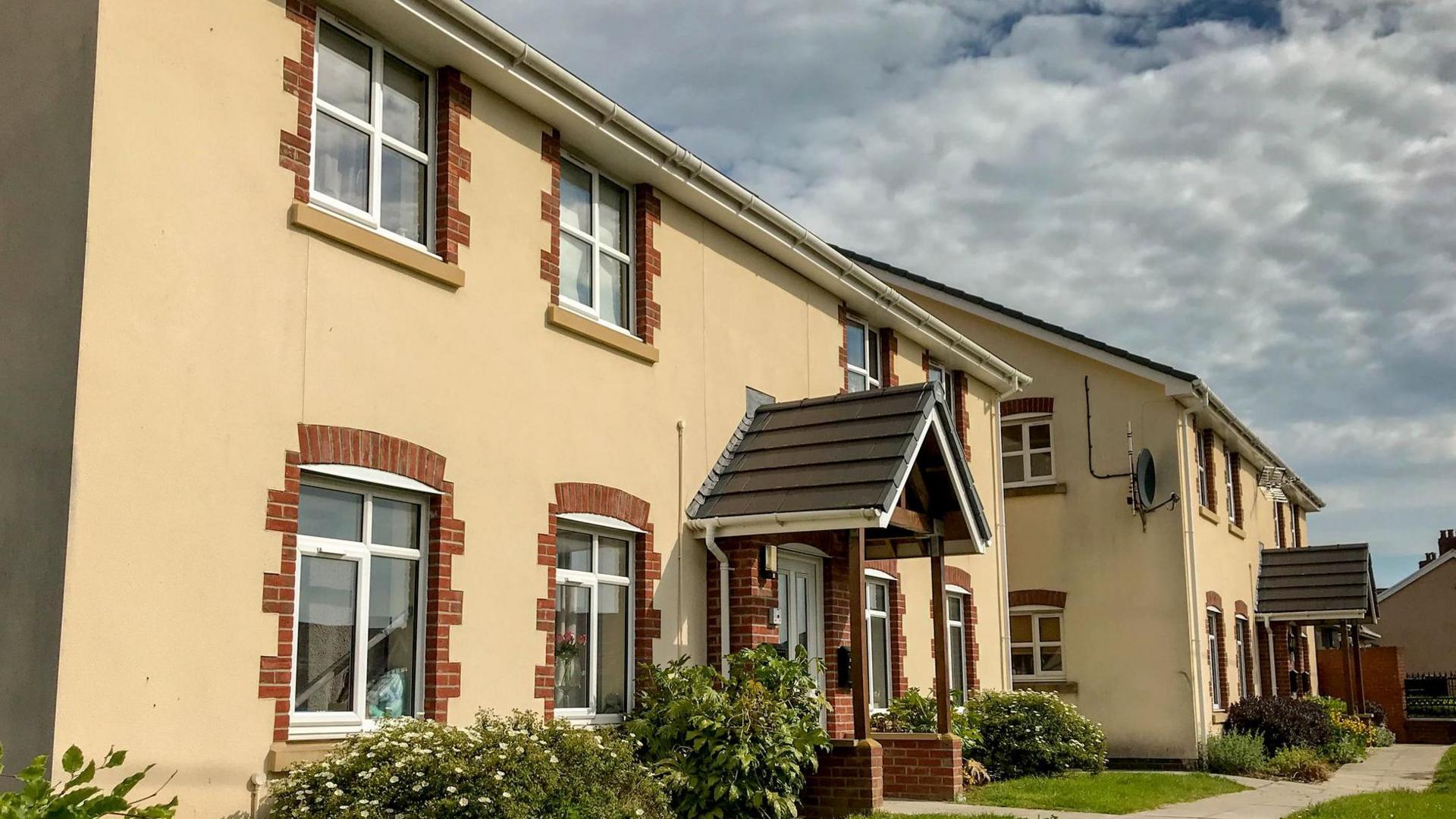More cash needed for 20,000 homes plan - watchdog

A minister previously warned that the social homes plan was "hanging by a thread"
- Published
Significantly more money is needed to reach a pledge to build more social housing in Wales, a watchdog says.
Fewer than half the 20,000 homes promised by Labour in its manifesto at the last Senedd election have been built.
Without extra funding, Audit Wales found the Welsh government could fall more than 4,000 homes short of its target by March 2026.
The Welsh government said high inflation made the target “even more challenging”.
Wales drops green target for social housing
- Published25 October 2023
Woman with £50,000 savings still can't buy a house
- Published13 July 2023
Plan for 20,000 social homes 'hanging by thread'
- Published19 October 2022
Ministers have already said rising prices had threatened to stop them creating all the low-carbon social homes they wanted in this Senedd term.
According to the latest estimate, the plan will cost around £1.8bn.
But Audit Wales estimates an extra £580m to £740m will be needed.
Its report says progress has been “slow and more expensive than initially expected”.
Up to 9,197 homes have been delivered so far, with 10,000 more in the pipeline.
That falls just short of the target, but the report estimates that without the additional funding, only between 15,860 and 16,670 homes will be delivered
“If the Welsh government is to meet the 20,000 social homes target by March 2026 it will need to spend significantly more than planned,” the report says.
It adds that there is a “high probability” that some of the “riskier schemes” will not happen, regardless of how much is spent.
Andrea Lewis, deputy leader of Swansea council and a housing spokesperson for Welsh Local Government Association, welcomed the report recommendations.
“If we’re going to reach that target, we do need more funding than was originally planned, due to the inflationary cost [and] the rise in building materials and constructing new homes,” she told BBC Radio Wales Breakfast.
Ms Lewis acknowledged a “national crisis” in housing, including a “significant hike” in the number of people becoming homeless, partly due to the cost of living crisis.
She said that in Swansea there were about 8,000 people on waiting lists as well as a “significant number of people” in emergency and temporary accommodation.
“We are pulling on all the levers,” she said, which included building new council homes and buying back former council houses.
'Unacceptable'
Inflation, which is outside the Welsh government’s control, has driven up the cost of building new homes.
In response, the Welsh government has paid for councils to buy or lease more homes, which also count towards the 20,000 target.
However, not all those homes are new or low carbon.
Auditor General Adrian Crompton said a lack of capacity in the planning system and complying with environmental regulations had delayed progress.
He said: “It (the Welsh government) is going to have to spend significantly more than it has currently planned for, and secondly, it’s going to need to deliver all the schemes in its pipeline of plans – and we think there’s quite a high risk some of those schemes won’t deliver in time or at all, regardless of the level of funding available.”
Welsh Conservative shadow housing minister Mark Isherwood said it was "unacceptable that this Labour government in Wales is falling so far behind on their house building target".
"Their policies are reducing affordable housing supply and their focus on tourism and second homes is deflecting from the wider need to deliver more housing."
Plaid Cymru MS Mabon ap Gwynfor said: "With a Labour government now in Westminster there are no more excuses to be made.
"If what’s really needed to hit the target is more funding, then the first minister should be picking up the phone to Keir Starmer and demanding a fairer deal for Wales."
A Welsh government spokesperson said: “There are a range of factors impacting housing supply, not least the recent sustained period of record inflationary pressures, which has made achieving the target even more challenging.
“Tackling homelessness and delivering more homes is a key priority for this government and we have set a challenging target and allocated record levels of funding to housing supply in this Senedd term, with more than £1.4bn invested so far.”
Rise in homelessness
Homelessness rose to its highest level in 10 years, according to statistics published on the same day.
There were 13,539 households classed as being homeless – an increase of 8% on the previous year.
The number of households in priority need of help rose 20% to 6,135.
The charity Salvation Army said a Welsh government commitment to end homelessness was “a step in the right direction”, but the Welsh and UK governments “must address the shortage of affordable housing stock, especially social housing”.
The Welsh government said the statistics “reflect the ongoing pressures within the system and the effects of the cost-of-living crisis on individuals and households”.
It said it was spending £220m this year on preventing homelessness and on cutting the number of people going into temporary accommodation.